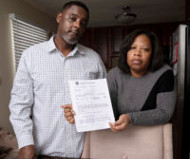5/24/2019
Innocent Driver Challenges Chicago, Illinois Car ConfiscationInstitute for Justice files class action lawsuit to shut down Chicago, Illinois car seizure program.

Innocent motorists are fighting back after the city of Chicago, Illinois confiscated their cars. In a lawsuit filed last month, the Institute for Justice charged the Windy City with violating the constitution by impounding the cars of motorists who have not committed any crime.
The civil rights group is using the test case of Jerome Davis and Veronica Walker-Davis. They lost their 2006 Lexus E330 last year after a mechanic -- without permission -- took a joyride in their vehicle when it was in the shop for repairs. Police pulled the mechanic over and saw he had a suspended license. The car was towed away and the Davises were told they had to pay $1170 in fees to get it back -- except the city disposed of the Lexus before they had a chance to do so. Another defendant, Spencer Byrd, was told after a 2016 traffic stop for a broken taillight he had to pay $17,000 to get his car back. A passenger in Byrd's 1996 Cadillac sedan -- a stranded customer to whom he was giving a ride home -- was found with drugs in his pocket.
"No person should be forced to pay for someone else's offense," Institute for Justice attorney Diana Simpson said in a statement. "Chicago holds all impounded cars as ransom, sometimes for long periods of time, until an owner pays all fines and fees. This unjust process violates both the Illinois Constitution and the United States Constitution."
Confiscation is imposed on cars for two dozen different offenses, including playing loud music, littering or driving with a can of spraypaint (see Municipal Code Section 8-4-130) or fireworks (Section 15-20-270) in the car. In 2017, Chicago grabbed 22,000 cars to generate $28 million in revenue -- averaging almost $1300 for each impound. The towing and daily storage fees add up quickly. Motorists who want to challenge the seizure must make a written, in person request for a formal hearing fifteen days after the seizure, even though the city can wait ten days before sending notice of the seizure.
Once the fifteen days expire, the city can immediately sell the car at auction, or the police can keep the vehicle for themselves. If a hearing is requested in time, the case will be heard by an employee of the mayor, not a judge. The case is heard under a preponderance of the evidence standard that requires only that the city prove it is "likely" that the vehicle was used in a city code violation. Typically, it takes 45 days to reach a final decision in such a hearing, during which time $1475 in storage fees would accumulate.
The Institute for Justice points out that this arrangement does not allow a motorist to claim innocence as a defense, and the group argues that this violates due process rights.


